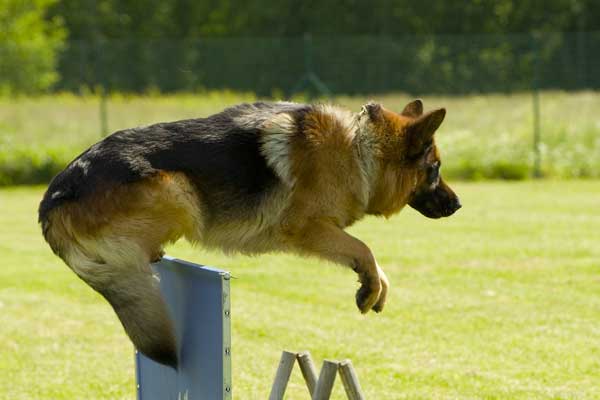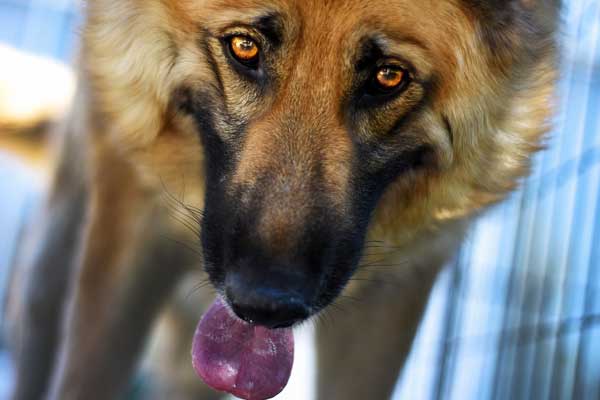German Shepherd Dog: Beauty, Brains, and a Noble Disposition!
German Shepherds are famous for their smarts, loyalty, and adaptability. They’re among the world’s most loved dog breeds, with a fascinating history and unique traits in both looks and behavior.
Understanding their origin, temperament, working abilities, care requirements, and common health concerns is crucial for potential owners.
This article aims to give you a thorough introduction to increase your knowledge of German Shepherds.
Exploring these topics will provide a comprehensive understanding of German Shepherds, allowing you to make informed decisions and provide the best care for this remarkable breed.
Key Takeaways:
- German Shepherds are versatile working dogs commonly used in police and military work, search and rescue operations, and as service or therapy dogs.
- German Shepherds have distinctive physical characteristics: They are known for their large size, strong structure, and various coat colors and textures.
- Proper care and training are essential for German Shepherds: They require regular exercise, a balanced diet, and grooming to maintain their health and well-being.
History and Origin of German Shepherds
German Shepherds have their roots in Germany from the late 19th century. They were initially bred for herding purposes but quickly gained popularity as working dogs due to their intelligence and adaptability.
These dogs are known for their loyalty, bravery, and exceptional handling of various tasks.
Physical Characteristics of German Shepherds
German Shepherds stand out from other dog breeds due to their unique physical traits.
This section will dive into the fascinating aspects of their size, structure, coat color, and texture.
From their sturdy build to their diverse range of coat patterns, we’ll uncover the unique attributes that contribute to the iconic physical appearance of German Shepherds.
Discover the facts and features that make these dogs stand out in the canine world.
Size and Structure
| Size | German Shepherds are large, typically standing 22-26 inches tall at the shoulder. |
| Structure | They have a strong, muscular build, slightly elongated body, and well-proportioned head. |
Pro Tip: When choosing a German Shepherd, consider its size and structure to ensure it meets your living arrangements and activity level.
Coat Color and Texture
- The coat colors of German Shepherds can vary and include black, tan, sable, and bi-color.
- Coat texture varies, ranging from short and dense to long and fluffy.
- The most common coat type for German Shepherds is the double coat, which consists of a dense undercoat and a harsh outer coat.
- German Shepherds with longer coats may require more frequent grooming and maintenance to keep their coat color and texture in good condition.
- The coat color and texture of German Shepherds are influenced by genetics and breed standards established by kennel clubs.
Temperament and Personality Traits of German Shepherds
German Shepherds are known for their unique temperament and personality traits, making them one of the most fascinating dog breeds.
In this section, we’ll discover what sets them apart by delving into their intelligence and trainability, unwavering loyalty and protectiveness, and boundless energy and active nature.
So, prepare to explore the remarkable qualities that make German Shepherds such remarkable companions.
Intelligence and Trainability
German Shepherds are widely recognized for their exceptional intelligence and trainability. To fully harness their potential, it is essential to adopt the following steps:
- Initiate early training to establish a solid foundation of obedience and exemplary behavior.
- Employ positive reinforcement techniques to effectively motivate and reward the desired behavior of your German Shepherd.
- Provide ample mental stimulation by introducing interactive toys, puzzles, and engaging tasks.
- Consider enrolling your German Shepherd in obedience classes or seeking guidance from a professional trainer who can provide structured training and proper guidance.
- Consistency and patience are paramount; devote regular practice sessions to reinforce and maintain the learned behaviors of your German Shepherd.
Loyalty and Protectiveness
- German Shepherds are famous for their strong sense of loyalty and their commitment to protecting their family members.
- They are instinctive to guard and protect their loved ones, making them exceptional watchdogs.
- German Shepherds display fierce loyalty and will go to great lengths to safeguard their family, making them a popular choice for personal and home protection.
- They are well-known for their territorial solid nature and will readily protect their territory from potential dangers.
- Because of their strong protective instincts, it is vital to provide proper socialization and training early to ensure they can discern between a genuine threat and a harmless situation.
Energetic and Active
German Shepherds are renowned for their energetic and active nature. This breed thrives and maintains a healthy lifestyle through regular exercise and mental stimulation. To ensure the happiness and fulfillment of your German Shepherd, consider the following:
- Provide daily physical activities such as long walks, jogging, or playing fetch to satisfy their energetic needs.
- Engage in mentally stimulating activities like obedience training, puzzle toys, or agility courses to keep them active and mentally sharp.
- Offer interactive playtime sessions to channel their abundant energy positively.
A companion of mine owns an incredibly energetic and active German Shepherd named Max. Every day, they embark on long hikes in the mountains, allowing Max to run and explore the surroundings freely.
Additionally, they actively participate in agility competitions, where Max’s energy and athleticism are gracefully showcased.
Witnessing Max’s vibrant and lively nature is truly astonishing, serving as a testament to the German Shepherd breed’s energetic and active characteristics.
German Shepherds as Working Dogs
German Shepherds, known for their intelligence and remarkable abilities, excel in various fields as working dogs.
From police and military work to search and rescue missions and serving as service and therapy dogs, these remarkable canines play crucial roles.
Unveiling the diverse applications of German Shepherds in assisting and protecting, we will venture into their involvement in law enforcement, contribution to life-saving missions, and invaluable service to needy individuals.
These loyal and highly trainable companions prove time and again why they are recognized as exceptional working dogs.
Police and Military Work
- German Shepherds excel in police and military work.
- They possess the intelligence and trainability required for narcotics and bomb detection, search and rescue operations, and apprehending suspects.
- Their loyalty, protectiveness, and ability to remain focused under stressful situations make them ideal for these demanding roles.
- Max, a German Shepherd, served as a police dog for eight years, assisting in locating missing persons and apprehending criminals. His dedication and bravery made him a beloved member of the police force.
Search and Rescue
- Training: Ensure the German Shepherd is trained in obedience commands and search and rescue techniques.
- Physical Fitness: Maintain the dog’s physical fitness through regular exercise and conditioning.
- Scent Training: Teach the dog to recognize and track scents, aiding in locating missing persons.
- Search and Rescue Techniques: Train the dog in various search and rescue techniques, such as area searches and scent discrimination.
- Handler Communication: Establish clear communication between the dog and the handler during search and rescue operations.
Service and Therapy Dogs
- Service Dogs: German Shepherds can be trained as service dogs to assist individuals with disabilities, such as guiding the visually impaired or alerting those with hearing impairments.
- Therapy Dogs: They can also act as therapy dogs, offering solace and assistance to individuals in hospitals, nursing homes, or various therapeutic environments.
- Empathy and Calmness: German Shepherds can sense emotions and provide a calming presence to those in need.
- Intelligent and Trainable: Their intelligence and trainability make them highly suitable for service and therapy work, as they can learn and perform various tasks.
Fun Fact: German Shepherds were one of the first breeds used as therapy dogs during World War II to assist soldiers in their recovery.
Caring for a German Shepherd
Caring for a German Shepherd is about ensuring their well-being and happiness through various aspects.
To keep your German Shepherd happy and healthy, give them the right food, groom them properly, and take good care of their coat. Each of these things is super important for your dog’s well-being.
So, let’s dive into the essentials of keeping these intelligent and loyal companions in their best shape and condition!
Exercise and Physical Activity
German Shepherds need regular exercise and physical activity to stay healthy and happy. Here are some fundamental aspects to consider:
- Exercise and Physical Activity Needs: German Shepherds are highly active dogs that necessitate daily exercise to prevent boredom and maintain optimal physical condition.
- Various Types of Activities: Engage your German Shepherd in different activities, such as brisk walks, jogging, playing fetch, and obedience training sessions, to fulfill their exercise and physical activity requirements.
- Mental Stimulation: Alongside physical exercise, it is equally essential to provide mental stimulation through puzzle toys, obedience training, and interactive play to keep your German Shepherd mentally sharp and stimulated.
- Varying Intensity: Incorporate a mix of high-energy activities and relaxed sessions to ensure a well-rounded exercise routine for your German Shepherd.
- Recommended Exercise Duration: Aim for at least 60-90 minutes of exercise per day to keep your German Shepherd happy, healthy, and adequately exercised.
Proper Nutrition and Diet
Proper nutrition and diet for a German Shepherd are crucial in maintaining their health and well-being. Ensuring they receive well-balanced meals that fulfill their specific dietary requirements is vital.
This entails offering them premium-quality dog food, providing fresh water, and occasionally indulging them with treats. A veterinarian can offer valuable guidance concerning appropriate portion sizes and dietary needs.
Grooming and Coat Care
- Brush your German Shepherd’s coat regularly to remove loose hair and prevent matting.
- Bathe your dog as needed, using a gentle dog shampoo and thoroughly rinsing it to avoid irritation.
- Trim your dog’s nails regularly to prevent discomfort and overgrowth.
- Keep your dog’s ears clean to avoid infections by using a dog ear cleaner and some cotton balls or wipes.
- Regularly inspect your dog’s teeth and gums, and use a toothbrush and toothpaste made for dogs to clean their teeth.
Common Health Issues in German Shepherds
People love German Shepherds because they’re intelligent, loyal, and can do many things. Like any other breed, they are also prone to specific health issues.
This section will explore the common health problems that German Shepherds might face. From hip dysplasia to degenerative myelopathy and bloat, we’ll shed light on these concerns and provide insights into their potential impact on our beloved canine companions.
So, let’s dive into the world of German Shepherd health and learn how to keep our furry friends happy and healthy.
Hip Dysplasia
Hip dysplasia is a well-known health issue that commonly affects German Shepherds. This problem arises when the hip joint doesn’t form correctly, leading to arthritis and causing severe pain.
Selecting a reputable breeder who conducts hip screenings for their breeding dogs effectively prevents hip dysplasia.
Additionally, exercising regularly and staying at a healthy weight can help prevent this condition.
With that in mind, it is highly recommended to consider providing joint supplements to support the hip health of your beloved German Shepherd effectively.
Degenerative Myelopathy
Degenerative Myelopathy is a nerve disease that gradually worsens and mainly affects German Shepherds. This condition gradually causes hind limb weakness and eventually leads to paralysis. Unfortunately, there is currently no known cure for this disease.
However, when symptoms are managed effectively and supportive care is provided, it can enhance the quality of life for dogs experiencing this condition.
It is crucial to emphasize the importance of regular exercise, a well-balanced diet, and maintaining a healthy weight in effectively managing Degenerative Myelopathy.
To ensure the best possible care for your German Shepherd with this condition, it is highly recommended to collaborate with a veterinarian closely.
Bloat
Bloat is a severe issue that can impact German Shepherds. To keep your dog safe from this condition and effectively handle it if it occurs, take note of these recommendations:
- Feed smaller, frequent meals to reduce the risk of overeating.
- Avoid rigorous exercise before and after meals.
- Use elevated food bowls to promote slower eating.
- Be aware of the symptoms of bloat, such as unproductive retching or restlessness.
- Seek immediate veterinary assistance if you suspect your German Shepherd is experiencing bloat.
Choosing and Training a German Shepherd
Thinking of acquiring a German Shepherd? Let’s dive into the essential aspects of choosing and training this remarkable breed.
We’ll explore key topics such as finding a reputable breeder, ensuring proper socialization and obedience training, and providing activities for their mental stimulation.
Get ready to discover the secrets to raising a happy and well-rounded German Shepherd companion.
Finding a Reputable Breeder
When finding a reputable breeder of German Shepherds, it’s essential to consider the following:
- Research: Look for breeders who have good reviews and a trustworthy reputation.
- Health Testing: Ensure the breeder conducts health tests for genetic conditions common in German Shepherds.
- Environment: Visit the breeder’s facilities to ensure the dogs are raised clean and humanely.
- Knowledge and Experience: Choose a breeder who is knowledgeable about the breed and has experience raising healthy, well-socialized puppies.
To ensure your German Shepherd is healthy and well-bred, finding a reputable breeder is essential.
Socialization and Obedience Training
Proper socialization and obedience training are crucial in shaping German Shepherds into well-behaved and balanced dogs. To achieve this, follow these steps:
- Expose your puppy to different environments, individuals, and animals.
- Begin training early, focusing on fundamental commands such as sit, stay, and come.
- Utilize positive reinforcement techniques by rewarding good behavior with treats or praise.
- If necessary, consider enrolling in puppy training classes or seeking professional assistance.
- Consistently carry out training throughout their lifespan to reinforce positive behavior.
Activities and Mental Stimulation
Engaging them in various activities is essential to promote mental stimulation in German Shepherds. These activities play a crucial role in their overall well-being.
Here are a few methods to engage and challenge your mind:
- Engage them in training sessions: These sessions help teach them new commands and tricks and challenge their minds.
- Introduce puzzle toys: Interactive toys that require problem-solving skills can provide a great mental workout for German Shepherds.
- Involve them in scent work: German Shepherds have powerful noses, so engaging them in scent detection games or tracking exercises can be highly beneficial.
- Set up agility courses: Creating obstacle courses can enhance their agility and problem-solving abilities.
- Play hide and seek: Hiding treats or toys around the house or yard and encouraging them to find these items can be a fun activity that promotes mental stimulation.
Some Facts About German Shepherds:
- ✅ German Shepherd Dogs are considered the best all-purpose workers among dogs. (Source: AKC)
- ✅ They are large, agile, and muscular dogs with a noble character and high intelligence. (Source: AKC)
- ✅ German Shepherds are known for their loyalty, confidence, courage, and steadiness. (Source: AKC)
- ✅ Dog enthusiasts love them, and are popular as companion animals. (Source: AKC)
- ✅ German Shepherds have a wolf-like appearance, strength, and a noble disposition. (Source: Rover)
Frequently Asked Questions
What is the German Shepherd dog breed known for?
The German Shepherd breed is famed for its noble demeanor, impressive intelligence, and remarkable knack for various tasks. They’re frequently employed in roles such as police work, search and rescue missions, guiding the visually impaired, and a variety of other jobs.
Is the German Shepherd a good family pet?
Yes, German Shepherds can make a great family dog. They are loyal, affectionate, and protective. However, they require a lot of exercise, training, and socialization to ensure their well-being and compatibility with children and other pets.
Are German Shepherds easy to train?
Yes, German Shepherds are highly trainable and excel at obedience training. Their intelligence and desire to make their owners happy make them fast learners. Because of their ability to be trained and adapt to various roles, many German Shepherds become outstanding service dogs or effective search and rescue dogs.
Do German Shepherds require a lot of grooming?
Yes, German Shepherds have a dense double coat that sheds once or twice a year and requires regular weekly grooming. Brushing their coat helps remove loose hair and prevents matting. Additionally, they may need more frequent grooming during shedding seasons.
Are German Shepherds good with children?
When properly socialized and trained, German Shepherds can be good with children. They are protective and loyal, making them great companions. However, supervision and teaching children to interact with dogs are essential to ensure a positive and safe relationship.
Where can I adopt a German Shepherd?
If you’re considering getting a German Shepherd as your pet, exploring rescue organizations and shelters is a good idea. Many of them have German Shepherds looking for caring homes. On the other hand, if you buy a German Shepherd, go with a trustworthy breeder who places importance on their dogs’ well-being and behavior.







